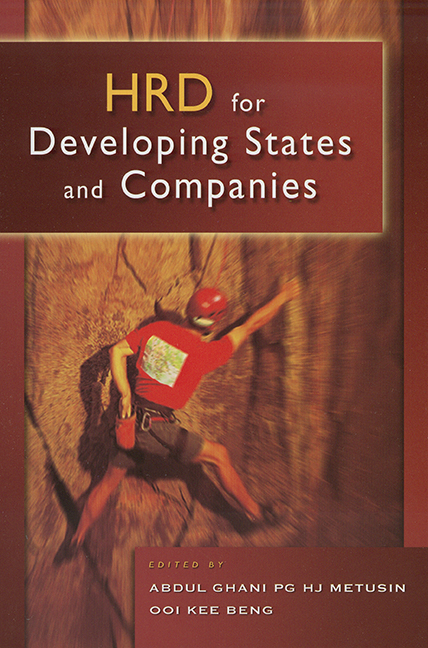Book contents
- Frontmatter
- Contents
- Foreword
- Preface
- Editorial Remarks
- Acknowledgements
- Introduction
- HRD for Statesmen
- 1 Human Resource Development in Developing Countries
- 2 Building the New HR Base — The Brunei Perspective
- 3 Managing and Achieving Excellence through HR Key Performance
- 4 Achieving an Integrated, Informed and Innovative Government for the Twenty-first Century — A Model for Emerging Markets
- 5 Human Resource Development — Challenges for the Public Services
- 6 Human-focused Management for Future Progress
- HRD Strategies for Companies
- Competence Development
- Corporate Experiences
- About the Authors
3 - Managing and Achieving Excellence through HR Key Performance
from HRD for Statesmen
Published online by Cambridge University Press: 21 October 2015
- Frontmatter
- Contents
- Foreword
- Preface
- Editorial Remarks
- Acknowledgements
- Introduction
- HRD for Statesmen
- 1 Human Resource Development in Developing Countries
- 2 Building the New HR Base — The Brunei Perspective
- 3 Managing and Achieving Excellence through HR Key Performance
- 4 Achieving an Integrated, Informed and Innovative Government for the Twenty-first Century — A Model for Emerging Markets
- 5 Human Resource Development — Challenges for the Public Services
- 6 Human-focused Management for Future Progress
- HRD Strategies for Companies
- Competence Development
- Corporate Experiences
- About the Authors
Summary
ABOUT SABAH
It is a huge state, the second largest in Malaysia, 73,000 sq. km in area, with a population of 2.6 million. It is highly agricultural, with a strong reliance on the tourism industry. It is similar to Sarawak and Brunei in that the manufacturing industry is very small.
In 1995, the 15-year Outline Perspective Plan was launched, and will end in 2010.
In 2003, the plan was revised and called the Halatuju Plan (Strategic Direction), with three areas of focus, namely, agriculture, tourism and manufacturing. The new emerging areas that Malaysia intends to focus on are biotechnology — which everybody talks about and which Malaysia is strong in — information and telecommunication.
CHALLENGES
The convergences of IT or ICT (Information Communication Technology) has led to many challenges, and Malaysia, being an open economy, has been forced to face them.
This means that a state like Sabah can no longer survive on its old economic system. To a nation or a state, a borderless world carries a lot of consequences. Globalization counts for a lot, and cultural, political, religious, and biological diversity must also be taken into account.
Malaysia, however, feels it can handle these challenges. Sabah itself is very diverse. Cultural diversity is no longer the problem now that it was in the early days. The idea of Bangsa Malaysia does not mean that everyone must be turned into Malays. Instead, all ethnic races can retain cultural, religious and ethnic identity, and live together in harmony. Misunderstandings on this point have been utilized politically in some quarters.
Sabah has seen a change of government every decade or so, and a stronger mandate was gained in the last elections, which did not involve any change in government. However, something important did occur, which harks back to the issue of handling cultural diversity and the economy. A stronger mandate was given to the government. Sabah has shown itself to be a politically experienced state.
- Type
- Chapter
- Information
- HRD for Developing States & Companies , pp. 18 - 23Publisher: ISEAS–Yusof Ishak InstitutePrint publication year: 2005

